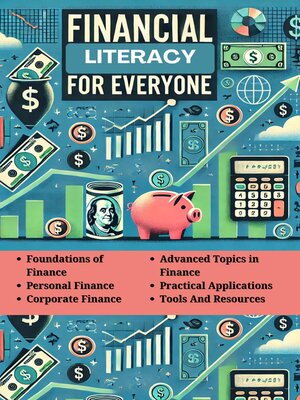
Sign up to save your library
With an OverDrive account, you can save your favorite libraries for at-a-glance information about availability. Find out more about OverDrive accounts.
Find this title in Libby, the library reading app by OverDrive.



Search for a digital library with this title
Title found at these libraries:
| Library Name | Distance |
|---|---|
| Loading... |
Financial literacy is a crucial skill that empowers individuals to make informed and effective decisions regarding their finances. It encompasses understanding various financial concepts, such as budgeting, saving, investing, credit management, and debt handling. Regardless of age, background, or income level, financial literacy is essential for achieving financial stability and long-term security.
One of the fundamental aspects of financial literacy is budgeting. Creating and sticking to a budget helps individuals track their income and expenses, ensuring they live within their means. It allows for better money management and prevents unnecessary debt accumulation. A well-planned budget also prioritizes savings, which is critical for emergencies, future investments, and retirement.
Saving and investing are key components of financial literacy. While saving provides financial security for unforeseen expenses, investing helps grow wealth over time. Understanding different investment options, such as stocks, bonds, and real estate, enables individuals to make informed decisions that align with their financial goals. Knowledge of risk management and diversification also plays a significant role in protecting and maximizing investments.
Credit management is another essential aspect of financial literacy. A good credit score opens doors to favorable loan terms, lower interest rates, and better financial opportunities. Responsible credit usage involves paying bills on time, keeping debt levels manageable, and understanding how credit scores are calculated. Mismanaging credit can lead to financial hardships, making it essential to educate oneself on responsible borrowing and repayment strategies.
Debt management is equally important. Many people struggle with student loans, credit card debt, and mortgages. Financial literacy helps individuals develop effective debt repayment strategies, such as the snowball or avalanche method, to minimize interest payments and pay off debts faster.
Additionally, financial literacy promotes informed decision-making about insurance, retirement planning, and taxation. Understanding different insurance policies protects against financial risks, while retirement planning ensures a comfortable future. Basic tax knowledge helps individuals maximize deductions, comply with regulations, and reduce tax liabilities.
Financial literacy should be accessible to everyone, as it empowers individuals to achieve financial independence and security. Schools, workplaces, and community programs should prioritize financial education to equip people with the knowledge and skills necessary to make sound financial decisions. By fostering a financially literate society, we can reduce economic disparities, promote wealth-building, and enhance overall financial well-being for all.







